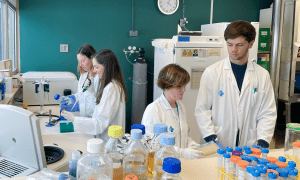RUTI® vaccine improves treatment of non-invasive bladder cancer by boosting immune response and providing clinical benefits

Administered before the standard treatment, RUTI® strengthens the immune response, reduces tumor recurrence and progression, and improves patient survival during the five-year follow-up of the study
Bladder cancer is the most common urological disease and, in more than 75% of cases, it is diagnosed in its non-muscle-invasive form. Although BCG –a vaccine originally designed against tuberculosis by the scientist Pere-Joan Cardona– is the standard treatment for non-muscle-invasive bladder cancer, its efficacy is still limited: tumour recurrence and progression remain a challenge for many patients. Now, a new therapeutic strategy opens the door to improving these results: the RUTI® vaccine, administered prior to intravesical BCG, boosts the immune system response and could reduce the risk of disease recurrence and progression. This is suggested by a pilot study, published in the journal European Urology, with the participation of IrsiCaixa –a centre jointly promoted by the "la Caixa" Foundation and the Department of Health of the Generalitat de Catalunya– the Germans Trias i Pujol Research Institute (IGTP) and Archivel Farma. This phase I clinical trial, carried out with 40 patients at the Germans Trias i Pujol Hospital, confirms the safety of the vaccine and shows an improvement in both the immune response and the clinical evolution and survival of the patients during the five years of study follow-up. These data provide first solid evidence that will need to be validated in larger studies to see if the benefit holds up in broader populations.
A more powerful and effective immune response
The RUTIVAC-1 clinical trial, involving 40 patients with high-risk non-muscle-invasive bladder cancer, has shown that the RUTI® vaccine is able to generate a more robust and functional immune response when administered prior to BCG treatment. This response is characterised by a more intense activation of defence cells –CD4⁺ and CD8⁺ T lymphocytes– and a higher production of immune-stimulating molecules, called cytokines, such as interferon gamma and interleukin-2. In addition, in patients vaccinated with RUTI®, the proliferation of regulatory T lymphocytes, a type of immune system cell that usually favours immunosuppression and that was mainly observed in the control group, which had only been administered BCG, was not detected.
"We have found that the RUTI® vaccine is capable of generating a prior immune response that prepares the body and makes it react more effectively to subsequent treatment with BCG. This effect is explained by the fact that, when two similar but not identical vaccines are administered sequentially –RUTI®, based on Mycobacterium tuberculosis, and BCG, on Mycobacterium bovis– the immune response generated is faster and more powerful," explains Cecilia Cabrera, co-lead author of the study and group leader of IrsiCaixa and the IGTP.
Promising first survival data
Despite being a phase I study with a small number of participants, the results point to a more favourable clinical outcome in patients who received the RUTI® vaccine before BCG treatment. This group had fewer relapses, fewer progressions, and longer survival during the five years of follow-up. In fact, no deaths were recorded among the participants in the RUTI® group, while in the control group three people died. This difference was especially accentuated in the subgroup of patients with high-grade T1 tumours (those with the worst prognosis), where 100% of those treated with RUTI® and BCG remained progression-free, in contrast to 63.3% of those who received BCG alone.
"The fact that the RUTI® vaccine is able to modulate the immune system response more effectively could explain the clinical benefit observed. These results suggest that it could have a real impact on improving the current standard of care, although this will need to be confirmed in larger clinical trials", explains Oscar Buisan, co-lead author of the study and urologist at the Germans Trias i Pujol University Hospital at the time of the study, currently a urologist at Bellvitge University Hospital and a clinical researcher at IDIBELL.
A safe and innovative option
The scientific team stresses that the RUTI® vaccine was found to be safe and well tolerated, with only mild reactions at the injection site. "What this study tells us is that the immune response is not only stronger and more appropriate to prevent the recurrence of the cancer, but that, unlike other immunotherapeutic strategies, it is achieved with an excellent safety profile and without serious adverse effects", says Pol Servian, co-lead author of the study and urologist at the Germans Trias i Pujol Hospital.
"Our goal with this strategy is to prepare the immune system to maximize the efficacy of subsequent BCG treatment. This could be especially beneficial for those patients with a poorer prognosis, where therapeutic options are more limited and cystectomy should often be considered", says Cabrera. Now, the team hopes to be able to move towards larger trials that will confirm the clinical benefit of this innovative proposal.